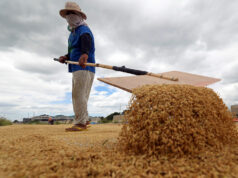SENATOR CYNTHIA A. VILLAR questioned the Department of Agriculture’s shift to farm credit from subsidies, saying that the strategy has lost over P8 billion for a previous government.
At a DA budget hearing, Ms. Villar, who chairs the chamber’s agriculture committee, said Secretary Emmanuel F. Piñol’s credit-based system did not succeed during the Arroyo administration.
“We did that before and we lost P8-billion. It was managed by DA and the Cocofund. So we transferred it to LANDBANK. Why are we going to that model?” Ms. Villar told Mr. Piñol.
“I read the mandate of ACPC (Agricultural Credit Policy Council). They are not allowed to give credit. You don’t transfer the money to ACPC, you give it to a bank and make a model how the bank will give it out,” Ms. Villar added.
The Arroyo-era losses stemmed from loan defaults.
“We’re not good at lending out money. ACPC lost P8 billion,” Ms. Villar said.
According to Mr. Piñol, the shift to farm credit was approved by President Rodrigo R. Duterte.
Mr. Piñol said in 2019, the proposed loan fund is P5.1-billion for 74,000 target beneficiaries. He said the DA has reformed the lending system to avoid the mistakes of the past.
“As of last year, the production loan easy access (PLEA) program channeled through cooperatives and rural banks has a repayment rate of 96%. The lending rate of LANDBANK was very low,” Mr. Piñol said, noting that the program started in June 2017.
In a statement on Monday, Land Bank of the Philippines said it has outstanding loans of P39.9 billion issued to fishermen and farmers as of the first half of 2018. Loan releases in the first six months amounted to P26.8-billion, which benefited 274,255 small farmers and fisherforlk.
ACPC Executive Director Jocelyn Alma R. Badiola said the agency is mandated to administer funds and credit lines are open to cooperatives through 163 banks all over the country.
“We are very careful with funds. We have learned our lesson… We are careful in selecting our loan conduits,” Ms. Badiola said.
Ms. Villar also called on Mr. Piñol to explain why the DA reduced the budget for domestic rice procurement to P7 billion from P11 billion previously.
The Department of Budget and Management reduced the DA budget by 10.54% to P49.8-billion in 2019.
Mr. Piñol said that the budget reductions were ordered by the Department of Budget and Management, noting that the DA had proposed P15 billion for rice purchases.
Mr. Piñol added: “In spite of this, we are still projecting that there will be major positive performances” in rice output but still called for a review of the budget amid a shortage of low-cost rice sold by the National Food Authority, which has emboldened sellers of commercial rice to raise their prices.
“We can be rice sufficient, but we have to invest… We have land and abundant sunshine, but we need irrigation,” Mr. Piñol said.
“The fact that we face a problem in food supply warrants a review of the budget,” Mr. Piñol said.
Ms. Villar said the main problem facing farmers was not irrigation but the lack of mechanization.
Meanwhile, Ms. Villar agreed that more funding for rice is needed.
“We will try [to increase the budget] but we are adding it indirectly via the Rice Competitive Enhancement Fund… in effect, we are not touching the budget proper but we are adding in other areas,” Ms. Villar said in a chance interview.
She said that her committee will “try hard” to pass the rice tariffication bill this month to liberalize rice imports. The tariffs generated by importing rice more freely will be applied towards making domestic rice farming more competitive.
Meanwhile, Mr. Piñol said that DA should not be blamed for inflation but rather pointed to tax reform, which has increased fuel prices. — Reicelene Joy N. Ignacio



